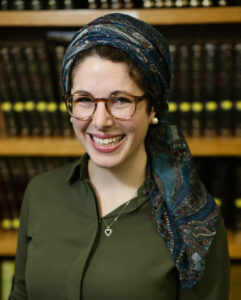
In seventh grade, Rabbanit Leah Sarna developed a love for studying Talmud.
As faculty member and director of Teen Programs at the Drisha Institute for Jewish Education, she’s focused on kindling that same love for others.
The 31-year-old grew up in the Boston suburbs attending an Orthodox Jewish day school and studied at a yeshiva in Israel, where she developed an affinity for Jewish text study, before moving to Bala Cynwyd and becoming a member at Sha’arei Orah Congregation.
“The genre of the Talmud is so special and unique: that it’s argumentative and conversational, that it’s not afraid of anything — there is no question off-limits in the Talmud — that it’s funny and interesting, that there’s so many different ways of reading it or levels of understanding it,” Sarna said.
Beyond the Drisha Institute for Jewish Learning, an institute founded in New York to give women the opportunity to rigorously study Jewish texts — and that is now open to all genders — Sarna wants to offer the lessons of the Talmud to anyone who wants it.
Sarna, who was ordained at Yeshivat Maharat in New York City in 2018, is one of 20 Jewish women scholars in the “Word-by-Word: A Jewish Women’s Writing Circle” cohort program created by Sefaria, to “increase and elevate Jewish scholarly publications authored by women,” as per a May 11 press release.
“One of the things that happens when you are a woman who spends her whole life studying Jewish texts, like I do, is that you have to contend with the fact that all day long, you’re reading things written by men,” Sarna said. “They’re just very, very few women in our canon.”
This doesn’t mean there are no Jewish women scholars, though. Works by women in the 16th and 17th centuries, often written in Yiddish, were not translated or are just being translated now. These texts never made it onto the shelves of Jewish scholars and were not cited or disseminated in the same way as texts written by men.
Sefaria, a nonprofit that organizes, translates and digitizes Jewish texts for free, wants to help rectify the gender disparity of available Jewish texts. The “Word-by-Word” initiative, led by Erica Brown and Sara Wolkenfeld and funded by Micah Philanthropies, Walder Foundation and the Arev Fund, provides writing support for the 20 cohort members, who will complete book-length texts at the end of the three-year program.
Through “Word-by-Word,” Sarna is working on a book about pregnancy, childbirth and early parenthood to serve as a guide for Jewish mothers.
“Pregnancy and childbirth and the first few months of parenthood are lonely times. There are times when you are really isolated; your experience is meant to be private in a way,” Sarna said. “And what I feel is that our tradition has so much to say about that time of life, but it’s very difficult to find context for teaching it.”
Sarna knows this from experience. She gave birth to her first child in April 2020, when the isolated experience of early parenthood and postpartum depression became even more isolated due to the pandemic. Guided by ancient Jewish traditions and texts, she learned to balance prayer with taking care of an infant, adapting baby naming rituals for a ceremony over Zoom.
By the time she gave birth to a second child in July, she adapted Jewish ritual for an in-person ceremony.
Among the prayers she recited was what she calls tefillat yoledet, “a prayer of thanksgiving by the mother who survived childbirth,” drawing inspiration from the Book of Samuel, when Hannah brings Samuel to the tabernacle after his birth and prays.
Deeply cemented in Jewish lore, stories that feature Jewish mothers are not readily available to all Jews.
“Most women today don’t know about that stuff and just feel like, Wow, the Jewish tradition forgot me,” Sarna said. “Which it didn’t! It’s just that the mimetic tradition of that was lost.”
Bringing ancient rituals and storytelling to the modern world is the crux of Sarna’s scholarship.
“The hope for this book is to help people and to bring parts of our tradition that are there, that are ancient, that are gorgeous and incredible and funny and interesting, and just make them available to people,” she said.
When it comes to the role and presence of women in these books, however, the translation of Jewish thought and ritual is not straightforward. Tradition has centered women in a Jewish home, so what happens when women have lives beyond the home? More broadly, what does modern spirituality look like?
Sarna and her “Word-by-Word” cohort will not be able to answer those questions, but she hopes to empower others to look for the answers.
“The Torah is available to you,” she said. “And it’s yours.”



